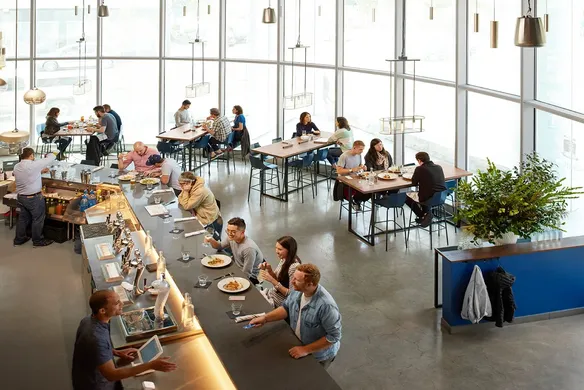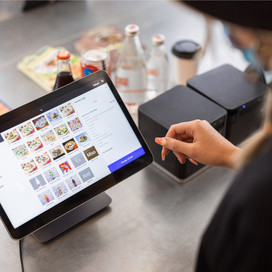Whether you’re an experienced restaurant manager or someone new to the hospitality industry, you’ll know that managing a restaurant effectively requires a careful balance of many different priorities.
An effective restaurant manager needs strong skills in customer service, marketing, operations, financial management and staffing as a bare minimum. For this reason, successful restaurant managers are usually comfortable wearing many hats at once – and excellent at managing their time.
Some of the most important aspects of managing a successful restaurant and keeping both customers and employees happy are below.
Hire – and keep – the right team
Most restaurants need a minimum of a chef, bartender and wait staff (servers). Each of these roles is very different from the others, and your recruitment process should reflect this. While experience is always great – and most would agree that hiring an experienced chef is a must – many hospitality roles lend themselves to entry-level staff. With this in mind, you should have a detailed position description for each job in your restaurant and make sure all employees know what’s expected of them.
Your wait staff are the interface between your customers and the kitchen, so it’s essential that they have a keen customer focus. They should be personable and efficient, and their approach should reflect the atmosphere you’re looking to create in your restaurant – whether an understated fine dining experience or a casual, upbeat feel. For the best eateries, good service is just as important as the food.
Your chef is usually not customer-facing but must have good people skills to support their culinary expertise. They’ll be dealing with your wait staff regarding any menu changes, delays in meal preparation and customer requests or complaints, so they must be able to work well in a team and keep their cool in high-pressure situations.
High staff turnover is a common challenge in the restaurant game. While some turnover is inevitable, it’s not a good look when regular customers walk in to unfamiliar faces on a regular basis. If keeping good staff is a challenge, speak to your employees about changes you can make to keep them as part of your team for longer. Exit interviews are a good opportunity to get honest feedback from someone who has already made the decision to leave and is likely to be less concerned about offending you.
Be smart with your marketing budget
It’s easy to continue with the same advertising approach or promotional activities “because it’s what we’ve always done”, but any marketing efforts should be supported by a clear return on investment (ROI). If you offer a regular happy hour, do you understand how much an average patron spends – and how often they stay on for a meal? If you’re advertising on social media, are you making the most of your social accounts – posting regularly, encouraging reviews and customer posts, making your content easy to share, etc.? If you’re short on time, a social media manager can help you with this.
A soft opening is a great way to market your restaurant to local press ahead of a full launch — it’s also a great way to gather feedback before you open the doors to paying customers.
Marketing is undoubtedly an important part of making your restaurant successful, but spending without a clear plan is a recipe for low returns. If you’d like to ramp up your marketing efforts but are unsure where to start, a restaurant consultant can help you to pull together a marketing strategy and plan.
Understand – and stay on top of – your finances
Without a solid understanding of your restaurant’s finances, you’re at significant risk. You must be able to read a profit and loss statement and should make time to monitor cash flow on a daily, weekly and monthly basis. A few quiet weeks or a change in your profit margins that goes unnoticed can have a fast and considerable impact on your financial position and could spell the end of your business if it’s not managed proactively.
If financial management isn’t a strength, consider hiring a consultant to bring you up to speed with some of the key metrics you need to understand and track constantly. You may choose to rely on a bookkeeper to meet your reporting obligations, however staying across your finances on a daily basis is non-negotiable if you want to succeed and grow. Today’s cloud-based point-of-sale (POS) systems make staying on top of your finances quick and easy. (More on this below).
Choose the right point of sale (POS) system
Cloud-based POS software such as Square POS uses real-time reporting and detailed analytics to help you make better decisions about the running of your restaurant. You can keep track of performance 24/7 from anywhere – drilling down to see what’s really driving the cash flow of your restaurant. Real-time data lets you understand which products customers are buying, how much they’re spending, and how this compares to the previous week or month at the click of a button.
Today’s POS software allows you to take customer orders and payments, manage employee clock-ins and clock-outs, track staff hours and identify your best performers, and access detailed performance metrics using a simple, customisable and intuitive interface. Most also [integrate with third-party software][8], allowing you to share your POS information to support bookkeeping and tax requirements.
Keep your menu fresh
Your menu communicates your brand and is what keeps customers coming back to your restaurant. It should send a clear and cohesive message about the types of food you serve and the level of professionalism with which your restaurant is run – it’s worth investing in professional proofreading, design and printing for your menu.
Updating your menu frequently allows you to keep pace with new industry trends and offer regular customers something new at their next visit. Importantly, it also gives you the opportunity to tweak your prices. The cost of food is changing all the time due to seasonality and supplier price rises, which has an impact on the overall cost of running your restaurant. A good POS system will help you to understand which menu items are your most and least popular – and profitable. When reviewing your menu, it’s also worth considering the shelf life of the ingredients you use – a product that can be safely stored for a longer period means less wastage.
![]()











